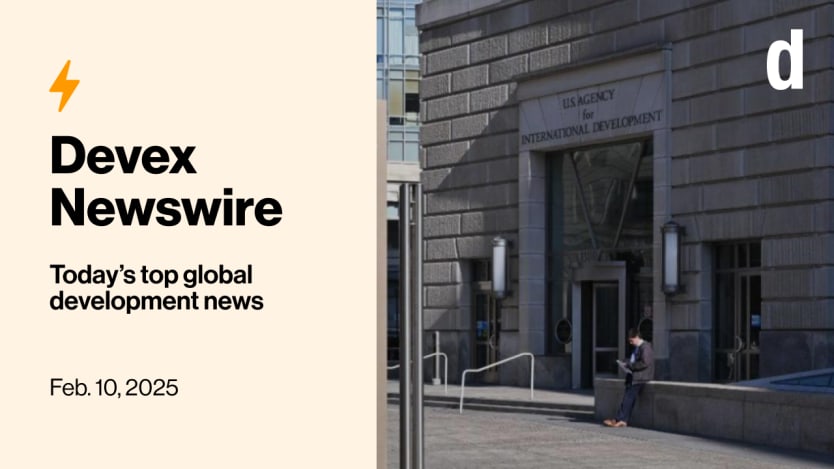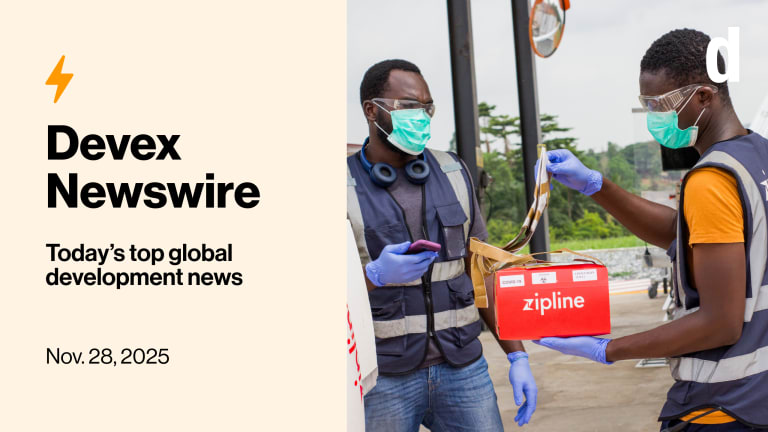Presented by Africa Health Agenda International Conference (AHAIC) 2025

Valentine’s Day — that’s the next critical deadline in the legal fight against the Trump administration’s quest to eradicate USAID.
Also in today’s edition: Why the world of U.S. foreign assistance will never be the same, regardless of what happens in the weeks and months ahead.
+ We have two events today, Feb. 10: Join us for the Development finance trends to watch in 2025 and a Devex Pro briefing with Jim Richardson. If you can’t attend any of these events live, register anyway and we’ll send you a recording. These events are for Devex Pro members. Not a Pro member yet? We offer a 15-day free trial.
Approaching midnight hour
Thousands of USAID direct hires were set to be put on administrative leave as of 11:59 p.m. this past Friday, but a last-minute federal court ruling blocked the move. Then on Saturday, we learned that the reprieve will last until Feb. 14, 11:59 p.m. — the latest twist in the tug of war over USAID’s future.
This is a preview of Newswire
Sign up to this newsletter for an inside look at the biggest stories in global development, in your inbox daily.
“All USAID employees currently on administrative leave shall be reinstated until February 14, 2025 at 11:59 PM, and shall be given complete access to email, payment, and security notification systems until that date,” read an internal email obtained by Devex.
The temporary restraining order also reinstates 500 staffers who had been placed on administrative leave and pauses the administration’s directive to recall nearly all of USAID’s overseas workers within 30 days.
It marks the first breather for USAID staff since U.S. President Donald Trump came into office and launched a ferocious campaign to dismantle the agency, resulting in a wave of administrative leaves, furloughs, and firings.
“The ruling is a crucial first step in halting a reckless assault on USAID and in supporting the dedicated professionals who serve our country,” Thomas Yazdgerdi, the president of the American Foreign Service Association — one of two unions that sued USAID, the State Department, and Trump — said in a statement.
Trump isn’t likely to let up — whether in the courts or the streets. My colleague Elissa Miolene reports that by Saturday morning, the letters spelling out the agency’s name at its headquarters in Washington, D.C., headquarters had been taken down, and several bouquets lay by a handpainted tombstone.
“RIP USAID,” the tombstone read. “1961-2025.”
Until the final ruling comes down — and who knows when that will be — USAID supporters are hoping it’s premature to declare the agency’s death just yet.
The next hearing is scheduled for Wednesday.
Read: All USAID staff on administrative leave reinstated until Feb. 14
ICYMI: Judge temporarily halts plan to put thousands of USAID staff on leave
No matter what, the ending won’t be happy
Struggling to keep up with the avalanche of events over the last few weeks? We have a deep dive to help you catch up on the existential battle for U.S. foreign aid. We titled my colleague Colum Lynch’s must-read article The end of foreign aid as we know it. The headline was not meant to be clickbait — because no matter what happens to USAID, the fact is America’s foreign aid footprint will never look the same.
“Take a quick scan across a horizon of human suffering — from the wars in the Democratic Republic of Congo, Sudan, and Ukraine to West African pandemics, famines in Ethiopia and Sudan, and tsunamis, earthquakes, floods, and droughts from Mexico to South East Asia — and you will find American contributions in the hundreds of millions and billions of dollars,” Colum writes.
That flow of money — which makes up an outsize share of official development assistance but a minuscule fraction of U.S. federal spending — has largely stopped during a 90-day review whose outcome remains a complete mystery.
In the meantime, Democratic cries of an unconstitutional takeover will continue — sure to fall on deaf ears in a Republican-controlled, Trump-beholden Congress — while lawsuits will trickle in, likely propelling the issue all the way to the Supreme Court, which too is heavily tilted in conservatives’ favor.
Can the industrial aid complex survive such a long bout of uncertainty and hostility — let alone the millions around the world who rely on American generosity? Even if they do, life will never be the same.
“The destruction of USAID, which is what is happening now, already has caused irreversible damage,” Nidhi Bouri, who served as deputy assistant administrator for global health during the Biden administration, tells Colum. “They’ve gutted the workforce, they’ve gutted so many systems and processes. You have essentially decimated the way the industry works, and are not putting back the tools that allow it to continue. It’s not as if you can just push play and resume it.”
Read: The end of foreign aid as we know it
‘Collective refusal’
Emotions among USAID staff are running high, as is the desire to do something, anything, to stop what’s happening.
“We must refuse to be ordered to throw our oaths of office in the trash by an unelected oligarch or his cronies,” one USAID team lead in the Middle East and North Africa region said in a fiery speech to internal staff, referring to Elon Musk, who heads the Department of Government Efficiency.
“Collective refusal is the most lawful and ethical course of action,” the lead added, arguing that the stop-work order is unlawful and that neither USAID nor the State Department allow for “forced departure.”
“Everyone was crying,” the lead tells my colleague Jesse Chase-Lubitz of the meeting. “So was I by the end of it.”
Exclusive: USAID team lead calls on staffers to ignore stop-work order
War of words
The Trump administration on Friday sought to expunge any references to diversity, equity, and inclusion, or DEI, and “gender ideology” in a series of UNICEF work programs in Colombia, Ethiopia, Iraq, Paraguay, and Rwanda.
In a meeting of UNICEF’s 36-member-state executive board, the U.S. objected to a statement authorizing the adoption of the country plans and blocked their approval by consensus, according to a senior humanitarian source.
The move underscores the administration’s commitment to pushing back on what it sees as an overly progressive U.N. agenda while raising the prospect of deep financial cuts to UNICEF, one of the U.N.’s most popular agencies, and one that has traditionally been led by an American national, Colum writes.
Jonathan Shrier, the acting U.S. representative at the session, defended the “no” vote.
“As Secretary [of State Marco] Rubio made clear, we must eliminate our focus on political and cultural causes that are divisive at home and deeply unpopular abroad,” he said. “In addition, it is U.S. policy to recognize two sexes, male and female, and not to promote gender ideology. It is particularly disturbing that this language is being used in UNICEF programming documents; children should be protected from this dangerous ideology and its possible results.”
Exclusive: The Trump administration takes war on DEI and gender global
ICYMI: USAID tells staff 'gender ideology' dilutes female advocacy
Speaking the same language
The world speaks over 7,000 languages. For all its hype, artificial intelligence is pretty much fluent in two of them.
That’s because most AI models, particularly large language models, are predominantly trained in English and Mandarin. This not only limits the accessibility of AI tools for billions of people but also risks perpetuating digital inequities, leaving marginalized communities behind in the AI race, my colleague Catherine Cheney writes.
In response, a growing coalition of donors — including the Gates Foundation and donors from Germany, the United Kingdom, and Canada — is working to ensure that AI models are trained on the languages spoken by most of the world.
They call themselves the AI for Development Funders Collaborative, and at this week’s Paris AI Action Summit, donors from the collaborative are pledging $10 million to support African-led efforts to ensure AI models are more inclusive of African languages.
Zameer Brey of the Gates Foundation tells Catherine that this is just a starting point — as it will take $50 million over the next four years to “unlock the language capability of about 40 African languages on the continent.”
Exclusive: Donors commit $10M to include African languages in AI models (Pro)
+ My colleague Fiona Zublin will be at the AI Action Summit. If you’re attending, send her a message at fiona.zublin@devex.com.
In memoriam
Tributes have poured in for the late Aga Khan, who died last week at age 88.
As the hereditary leader of 15 million Ismaili Muslims and founder of the Aga Khan Development Network, His Highness Prince Karim Al-Hussaini, the Aga Khan IV, transformed Islamic philanthropy into a global development powerhouse over his six decades of leadership, Devex contributor Rebecca Root writes. He pioneered a unique approach to development that blended faith-based values with secular institution-building while championing locally led development decades before it became a mainstream practice.
“It is not just a loss; it is the departure of a luminous soul whose life’s work illuminated the path for millions,” Munir Merali, a business development consultant, shared in a tribute on LinkedIn. And at this time of tumult in the development sector, Merali wrote: “It is upon us to carry that light forward, to serve with humility, and to honor his legacy not just in memory, but in action.”
Read: A ‘trailblazer’ — the Aga Khan’s legacy as turmoil grips development
In other news
French President Emmanuel Macron announced a €109 billion ($112.53 billion) investment in AI initiatives, promoting the technology’s potential with AI-generated videos of himself in different roles. [France 24]
The Vatican’s point man on migration and development criticized Trump’s immigration policies and USAID cuts, saying these moves terrorize migrants and threaten church aid programs. [AP]
The U.K. plans to expand ties with Taiwan through new agreements on digital trade, investment, and renewable energy, defying China’s attempts to isolate the island. [Nikkei Asia]
Sign up to Newswire for an inside look at the biggest stories in global development.








